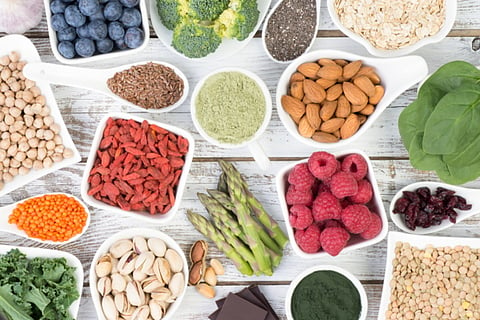How clean are your eating habits?
With the phrase clean eating increasingly prevalent in the media, what does it actually mean and is it merely the latest fad?

Is clean eating a fad, a lifestyle choice, a diet, a belief system or a combination of all the above? There is a lot of buzz about the emerging clean eating lifestyle trend; from diet books and recipes to Instagram feeds, the clean eating trend seems to be everywhere lately. But what exactly is clean eating?
“Clean eating is more of a lifestyle than a diet,” says Dr Wafaa Ayesh, Director of Clinical Nutrition, DHA. “It is a simple concept of embracing healthy eating habits such as choosing fresh vegetables, fruits, wholegrain, healthy proteins, dairy and fats in their least processed form while avoiding refined, processed and unhealthy junk foods.”
There are lot of health benefits associated with clean eating and following a healthy diet, including weight loss in individuals who are overweight or obese, if it is combined with regular exercise; better immunity due to intake of more fruits, vegetables and whole foods; increased energy; glowing skin; and improved sleep. “In today’s era of increased food processing trends, clean eating can be a bit challenging but certainly possible if you plan your meals ahead,” explains Dr Wafaa.
Helping children develop clean eating habits
“My kids love chicken nuggets and I have stopped buying them because they are highly processed,” says Sumeet Sandhu, a banker and mum of two children, 11 and 9. “Stopping them from having their favorite snack was not easy. I now tell my kids if they want to eat chicken, I will cook it fresh.”
Over time Sandhu has eliminated quite a few items from her pantry; from long shelf life food — which has additive preservatives to make it last longer — to instant noodles, processed food and sauces. “My new mantra is: if there are too many items on the label of cans or food, then it stays on the shelves and does not make it back home to my pantry,” she explains. “If my kids want to snack, I will offer them more natural and unprocessed options.”
Experimenting with clean eating
Studies show that avoiding processed foods and eating more natural, plant-based foods can prevent common disorders such as high blood pressure, cardiovascular disease, diabetes type 2 and even lower the risk of certain types of cancer. Clean eating can also help with weight loss or with maintaining a healthy body weight.
“In my clinic I strongly support clean eating even if I might not label it that as a dietitian,” says Katharina Elbracht, Clinical Director at Beyond-nutrition.ae in Dubai. “A healthy, balanced meal plan always is based on as much unprocessed food as possible with the addition of some minimally processed foods (such as frozen vegetables instead of fresh ones) for convenience purposes.”
Katharina says the clean eating approach can be realised with a mixed diet as well as a vegetarian or fully plant-based diet. A clean diet is generally very nutrient dense, which means it is higher in vitamins, minerals and fibre compared to a diet that includes a lot of processed and refined foods. This can be explained by the greater consumption of vegetables, fruits and other unprocessed foods as well as the lower consumption of fat, sugar and salt — processed foods usually contain a lot of these.
Types of clean eating fads/diets
In the trendy world of diets, there are certain buzz words — such as clean, paleo, primal and juicing — where the common thread is the idea of eating clean. The basis of this theory is avoiding eating processed food with unhealthy ingredients, focusing on diets that were from a pre-agricultural hunter-gatherer lifestyle, or excluding certain food groups and animal by-products entirely, or eating as cavemen did. The bottom line is to focus on health and enjoy the benefits.
“I recently did a detox to cleanse my body; it was not a diet, we have enough stored nutrients in our body, so my detox was basically to cleanse the body of toxins,” says Sharmila Rajesh, a homemaker and part business owner in Dubai.
“I wanted to follow a 30-day detox programme but due to family commitments and certain health constraints I just did it for ten days and even in that short period of time I noticed so many positive changes — physically and mentally.”
The other side of eating clean
Whilst there are numerous benefits, the clean eating craze can imply anyone who isn’t eating clean is eating dirty. People may feel defeated if they are unable to be successful in meeting the clean eating definitions. Clean eating is not meant to assign moral value to eating habits. Because a person chooses to eat clean doesn’t mean they are a better eater compared to someone else.
“Some mental health specialists believe that following ultra-healthy diets can have a negative impact on people who have been struggling with weight loss as some of them might be at risk of developing an eating disorder,” explains Dr Wafaa.
While adopting a healthy diet and lifestyle, people should be determined — and not obsessive.
Sign up for the Daily Briefing
Get the latest news and updates straight to your inbox



